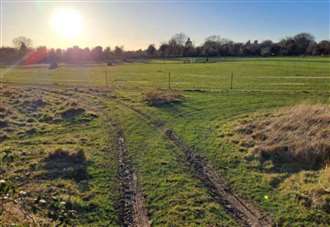Business
Planning Inspector Rejects Controversial Housing Development Appeal

A planning inspector has dismissed an appeal from Clague Architects regarding a proposed housing development in Great Mongeham, Kent. The original application sought to construct 23 new homes on five acres of farmland but faced significant opposition from both the local council and residents. This decision follows the earlier rejection by the Dover District Council (DDC), which cited concerns about the project’s impact on the rural character of the area.
The proposal, located off St Edmunds Road, was met with considerable backlash, leading to 215 letters of objection from local residents. Concerns raised included potential harm to wildlife habitats, pedestrian safety, and issues related to noise and air pollution. Villagers also expressed fears about the loss of privacy, increased light pollution, and questioned the need for additional housing in the area.
In its initial ruling, DDC emphasized that the development would cause “significant harm to the character and appearance of the countryside and landscape area.” The Great Mongeham Parish Council echoed these sentiments, deeming the proposal “completely unsuitable for the location.”
Despite these objections, Clague Architects appealed the decision, arguing that the development would contribute to what they termed “windfall development,” essential for the local authority to meet its housing targets. They contended that the refusal based on landscape impact was “not justified or grounded within accepted landscape impact assessment methodology.”
However, the planning inspector ultimately sided with the DDC. He determined that the potential damage to the landscape and heritage assets significantly outweighed the benefits of the proposed housing, which included affordable and self-build options.
Additionally, a separate ruling regarding costs found that the DDC had acted reasonably in its original decision, thus no costs were awarded to the appellant. The application site is currently used for horse grazing and serves as a village green for community activities, including fairs and recreational sports.
The rejection of this appeal marks a critical moment in local planning, reflecting ongoing tensions between development needs and preserving rural character and community interests. As discussions about housing and environmental impact continue, this case highlights the complexities local councils face in balancing these competing priorities.
-

 Health3 months ago
Health3 months agoNeurologist Warns Excessive Use of Supplements Can Harm Brain
-

 Health3 months ago
Health3 months agoFiona Phillips’ Husband Shares Heartfelt Update on Her Alzheimer’s Journey
-

 Science2 months ago
Science2 months agoBrian Cox Addresses Claims of Alien Probe in 3I/ATLAS Discovery
-

 Science2 months ago
Science2 months agoNASA Investigates Unusual Comet 3I/ATLAS; New Findings Emerge
-

 Science1 month ago
Science1 month agoScientists Examine 3I/ATLAS: Alien Artifact or Cosmic Oddity?
-

 Entertainment5 months ago
Entertainment5 months agoKerry Katona Discusses Future Baby Plans and Brian McFadden’s Wedding
-

 Science1 month ago
Science1 month agoNASA Investigates Speedy Object 3I/ATLAS, Sparking Speculation
-

 Entertainment4 months ago
Entertainment4 months agoEmmerdale Faces Tension as Dylan and April’s Lives Hang in the Balance
-

 World3 months ago
World3 months agoCole Palmer’s Cryptic Message to Kobbie Mainoo Following Loan Talks
-

 Science1 month ago
Science1 month agoNASA Scientists Explore Origins of 3I/ATLAS, a Fast-Moving Visitor
-

 Entertainment2 months ago
Entertainment2 months agoLewis Cope Addresses Accusations of Dance Training Advantage
-

 Entertainment3 months ago
Entertainment3 months agoMajor Cast Changes at Coronation Street: Exits and Returns in 2025









